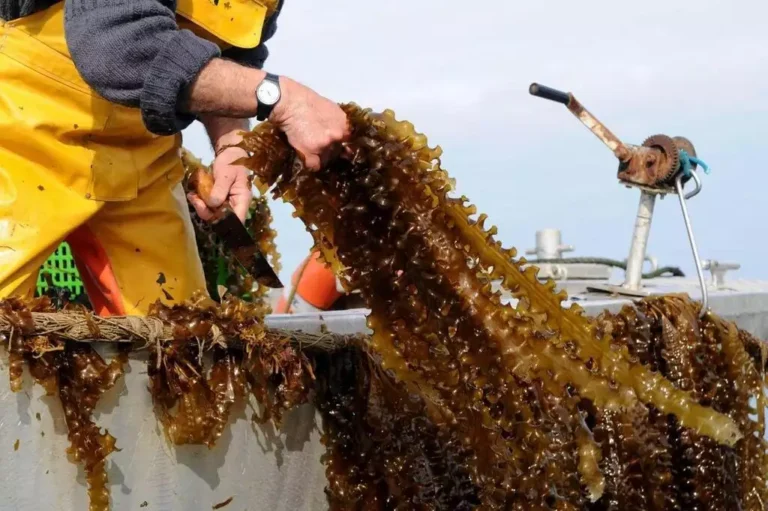In the Marchica lagoon, in the province of Nador, a pioneering experience in marine algae cultivation, particularly red algae, is developing as part of an environmental project aimed at innovatively and sustainably exploiting marine resources.
Considered the first of its kind in Africa, this project, led by the Marchica Traditional Fishing Cooperative, reflects a new approach to diversifying the maritime economy through the exploitation of the region’s environmental potential and its transformation into a source of income and local development.
Algae cultivation is a promising sector both economically and for the preservation of ecological balance: thanks to its unique specifics, this activity has become an interesting option to contribute to the supply of raw materials used in various fields, from cosmetics to the pharmaceutical and food industries.
This cultivation includes several steps that begin with the selection of seedlings by aquaculturists, who then position them on lines in the water, allowing them to grow in a natural environment without the need for industrial interventions. After weeks of monitoring, the algae are harvested manually to preserve their quality, before being washed and dried according to precise standards that ensure the preservation of their natural properties.
In the Marchica lagoon, the project has not only integrated fishermen but has also opened the way for other categories, including women, to participate in the various stages of production, making the Traditional Fishing Cooperative a model to follow in creating new job opportunities and strengthening the role of the solidarity economy in achieving local development.
Launched several years ago, this ambitious project has established itself as a model of innovative development, thanks to the efforts of the stakeholders who are betting on its expansion while emphasizing the improvement of production techniques and strengthening its competitiveness in national and international markets.
In this regard, the president of the Marchica Traditional Fishing Cooperative, Mimoun Bouhcine, highlighted in a statement to MAP that this project represents a significant and important experience that merits establishing a new model of maritime work for local professionals.
He explained that the Cooperative, founded in 2013 with a group of 74 fishermen, has placed great importance on coordination with its members as well as training to ensure the project’s success, stating that the support received from the Global Environment Facility (GEF) in 2014 facilitated the launch of the “Seaweed Farm” project, a fundamental step towards the expansion of algae cultivation in the lagoon.
According to Mr. Bouhcine, the Cooperative undertook its first algae cultivation experience in 2015 on a surface area of one and a half hectares before moving, in a second phase of the project, to 5 hectares, representing a qualitative leap in terms of expansion and development of the activity with a production of 23 tons of algae, while the third phase, during which an area of 11 hectares was exploited, allowed production to reach 57 tons of algae.
He also noted that despite the climatic challenges resulting in particular from the lack of rainfall in recent years, the project has maintained a good production rate, with a total estimated in 2024 at 30 tons of algae, which are sent to industrial units in Kenitra.
He added that the algae cultivated in the Marchica lagoon are of high quality, making them a raw material of significant economic value, noting that the algae, which can be used for a wide range of applications (cosmetics, food and pharmaceutical industries, etc.), are in high demand in both national and international markets.
Regarding the project’s prospects, he indicated that the cooperative has been able to establish a partnership with the Ministry of Agriculture, Maritime Fisheries, Rural Development, and Water and Forests, which will allow for the construction of a storage and processing unit for its algae product, in addition to support from other parties to develop methods and working means, ensuring that these interventions will help increase the number of beneficiaries of the project and improve their incomes.
For his part, Jaouad Fertitcho, a member of the cooperative, considered that the seaweed farm project is a rich experience and an important economic opportunity for him as well as for many young people and fishermen, especially in light of the decline in traditional fishing activities.
He continued that the project has greatly changed the lives of many young people in the region and encouraged them to engage in aquaculture, given its promising prospects and development potential.
The experience conducted by the Marchica cooperative has proven that algae cultivation is not just an economic activity, but rather a vision for the future with great potential for expansion and growth capable of strengthening Morocco’s position in the field of aquaculture.
In addition to its economic dimension, algae cultivation plays an important role in preserving the ecosystem of the Marchica lagoon, as it contributes to improving water quality and strengthening the biological balance within the marine ecosystem, in addition to the fact that the use of sustainable production techniques makes this activity a model of a blue economy that respects natural resources.


